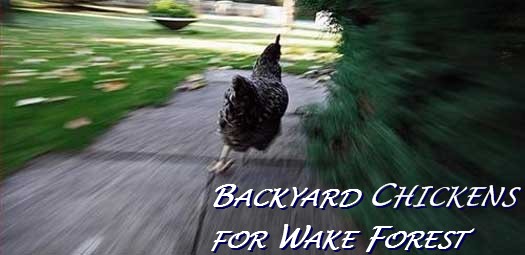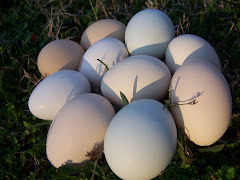Chickens in our backyards!
In Wake Forest, NC there is a movement afoot. Like much of the country, many of our citizens are yearning for healthier, more sustainable options for our weekly menus. Some of the ways individuals are trying to meet this need include creating backyard vegetable gardens, buying into organic garden co-ops, buying more produce from the local farmer’s market or farm stand, and raising chickens.
Wait a minute – raising chickens? In Wake Forest? You read that right, there are more than a few residents in the town of Wake Forest who have chickens living right in their backyards, and you never even noticed! Before you freak out, and start peeking over fences, or calling animal control, I'd like to implore you to learn the facts about chickens and the new wave of backyard farmers, and maybe you'll change your mind and decide to get a few for your family.
Many members of the general public feel that chickens are noisy, dirty, and attract rats. All of these things could be considered true under certain circumstances; however, let us take a quick look at the other animals we consider pets in our town.
Cats and dogs can both be noisy, remember that cat fight that woke you up at 4 am last week? When your neighbor gets home from work, do his dogs bark like mad until he drops his briefcase and gives each of them a good rub? Yes, chickens can be noisy animals, but usually the loudmouth in the group is the rooster. He’s the one who will wake you up at dawn (maybe before), announce that it’s mid-morning, lunchtime, 5 minutes past lunchtime, and any other time of the day he feels necessary. Roosters are loud animals, and I believe we all agree they shouldn't be kept in a neighborhood. When keeping chickens in the backyard as a pet or for egg laying, roosters aren't part of the equation. Roosters are not a necessary part of the egg-laying process. The sweet female hens make a gentle clucking, or bok-bok, usually unnoticeable to passers by.
As far as being dirty animals, well – if they're housed properly, there should be no lingering smell or odor from the chicken defecation. Proper housing, say, in a movable chicken ark (check out http://www.catawbacoops.com ), or chicken ‘tractor’, will allow any feces to be spread around the yard, and almost immediately composted into the soil, providing ‘free’ fertilizer for your lawn. This fertilizer is all natural too – no harsh chemicals to run off into the water table. The soiled bedding is also a wonderful addition to the backyard compost pile, and once composted is one of the best additions to a veggie garden. What do you think they sell in those bright yellow bags at the big home improvement stores? Where do you think that bag of ‘Black Chicken’ comes from?
One other argument I've heard is that chickens attract rats. This is something that reflects poorly managed property. As long as the chicken’s feed is kept in a sealed container, there isn’t a problem with rats or other scavenger animals getting into it. If you leave your birdseed out in the paper or plastic woven bag, it’s going to get ripped into by squirrels, rats, opossums, or weasels.
Once you've learned the facts about keeping ‘backyard’ chickens, you see that they're not a threat to property value, they're not going to wake you up in the middle of the night, and they're not going to pick a fight with your neighbors dog through the fence.
Now that you know what they won't do, you have more questions... You may wonder “WHY – why to my neighbors want to keep chickens anyway?” Well, from the pet chicken owners I've talked to, there are many answers. Almost all of them said “healthier eggs – knowing where my family’s food comes from”, many also responded by saying they were “reducing their carbon footprint”, a few even said “chickens are entertaining!”.
All of these reasons sounded great to me... and I decided I would love to have some chickens in my backyard too! Initially I thought I would like my children to learn more about where their food comes from, the life cycle of a chicken, the responsibilities of taking care of a small animal which sits at the bottom of the food chain, and yet provides so much to our family. So, I did some research... I found out a lot about chickens that I didn't know before.
Did you know that the majority of the eggs you buy from the supermarket are about a month old? They were laid by a hen whose beak had been painfully chopped off, stuck in a cage roughly the size of a sheet of paper, injected with hormones, and fed highly processed food in order to have her lay as many eggs as possible? She most likely couldn't even spread her wings, or turn around in her cage. Wow... makes you think a little doesn't it? I realized it is also important to me to teach them the importance of proper and humane treatment of food animals, and how we can have quality, humanely produced food, something which seems lacking in mainstream society these days.
Are you interested in keeping a small backyard flock for your family? If you are, there are several hoops you need to jump through. Wake Forest considers chickens (hens and roosters) as ‘livestock’, and there are certain permit procedures you must follow before being allowed to have them as pets. Currently in the town limits, a resident must acquire the permission of each homeowner within a 500 foot radius of the property where the chickens will be kept, (in my case it included 37 homeowners!) then they must go to the town and get a permit, which is good for one year. There is more specific information about this process available in a free e-book at www.catawbacoops.com.
I would like to change the public’s viewpoint on backyard chickens. I hope I have helped you come to a better understanding of the backyard chicken movement. Chickens aren't noisy, dirty animals. They're a great source of food for our families, and are one of the few ways we can become more environmentally conscious and provide sustainable food for our families.
If you're interested in helping Wake Forest join many of the more progressive cities and towns which recognize the need for a more sustainable urban landscape including household food production, please contact me, Emily Cole, at wfchickens@live.com.
Wake Forest Residents (ZIP code 27587) please sign: http://www.ipetitions.com/petition/WakeForestChickens/
Here is the story that ran on our local station: NBC17 in Raleigh!






No comments:
Post a Comment